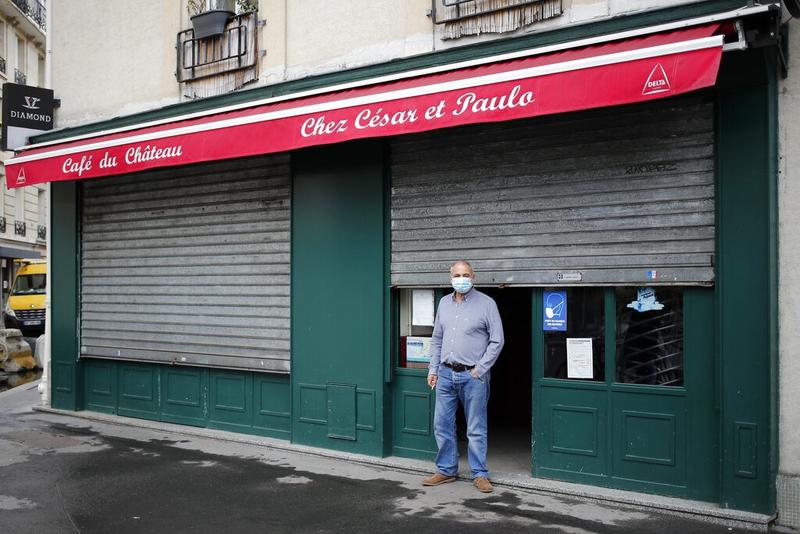 A bar owner stands in front of his closed bar, in Paris, France, Oct 6, 2020. (FRANCOIS MORI / AP)
A bar owner stands in front of his closed bar, in Paris, France, Oct 6, 2020. (FRANCOIS MORI / AP)
French authorities have placed the Paris region on maximum virus alert, banning festive gatherings and requiring all bars to close but allowing restaurants to remain open, as the number of infections increases rapidly.
French Finance Minister Bruno Le Maire said on Tuesday the government was ready to do more to support the bar and restaurant sector, one of the worst hit by the pandemic. He told Franceinfo radio that new details could be unveiled next week.
Starting on Tuesday, bars will be closed in Paris and its suburbs. Student parties and all other festive and family events in establishments open to the public will be banned.
French Finance Minister Bruno Le Maire said the government was ready to do more to support the bar and restaurant sector, one of the worst hit by the pandemic. He told Franceinfo radio that new details could be unveiled next week
Paris police prefect Didier Lallement announced on Monday that the new restrictions would apply at least for the next two weeks. "We are continuously adapting to the reality of the virus. We are taking measures to slow down (its spread)," he said.
French authorities consider bars to be major infection hot spots because patrons don't respect social distancing rules as much as they do at restaurants.
ALSO READ: COVID-19: EU ministers agree on 672.5b-euro recovery scheme
Restaurants will remain open under strict conditions. They include a minimum one-meter distance between each table, groups limited to six people instead of 10 previously, and a request to register customers' names and phone numbers to help alert those who may have been exposed to someone with the coronavirus.
Indoor sport facilities, including swimming pools, will only be open to children aged under 18. Gyms are already closed.
Authorities have maintained the limit of 1,000 spectators per day at big sports events, allowing the Roland-Garros tennis tournament to continue as planned this week.
The owner of one Paris eatery north of the Bastille felt relief that the measures mean only reasonable constraints for restaurants. He even saw a silver lining.
"I'm relieved that I don't have to close and that the rules are not more stringent," said Virgil Grunberg, who owns Le Square Gardette.
"It's even worse for bars, because they are going to be closed, so people are going to need places to have a drink and hang out," Grunberg said. "So I think (customers) are not going to be scared by the new restrictions."
The alert has already been raised to the maximum level for 12 days in the southern city of Marseille and nearby Aix-en-Provence, as well as the French overseas territory of Guadeloupe, in the Caribbean.
France, one of the hardest hit countries in Europe, has reported 32,299 virus-related deaths since the beginning of the pandemic. The cumulative number of cases is more than 624,000.
READ MORE: Paris palaces face gloomy future
Warning over impact
In the United Kingdom, research by international law company Baker and McKenzie has revealed that the combination of the pandemic and the country's potential departure from the European Union without a trade deal could cost the UK as much as $174 billion in lost GDP each year for the next decade.
Britain formally left the EU at the end of January, entering a transition period which lasts until the end of 2020, during which time the two sides were supposed to reach an alternative trade arrangement. Weeks later, the pandemic erupted, transforming the global political landscape and putting national economies and infrastructure under unprecedented strain.
It also meant negotiations were sidetracked for some time, and now British Prime Minister Boris Johnson's self-imposed deadline of Oct 15 for a deal is looming, with no obvious sign of significant progress.
Agencies, Julian Shea in London and Xinhua contributed to this story.



